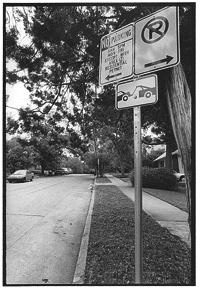The Lords of Parking
Neighborhood Associations Deciding Curbside Privileges
By Jeff Mandell, Fri., Aug. 28, 1998
|
|
Imagine my surprise: Only days after I moved into a new duplex, I came home from work to find my street and most nearby streets lined with new signs declaring it illegal to park on the street between 8am and 5pm without a permit for Area 2. Illegal? Permit? Area 2? A few phone calls to the city of Austin ascertained that my neighborhood association - the Eastwoods Neighborhood Association, governing the area from 26th to 32nd, and from I-35 to Duval - was behind the signs, and that I would need to purchase a permit from an officer of the NA if I wished to have street parking privileges. Neighborhood association? Purchase? Ever since I had signed my lease, people had warned me about law and graduate students from UT colonizing the neighborhood during the days. My predecessor in the duplex even complained that law students had on occasion parked without permission in his driveway (although my neighbors in the other duplex do not corroborate this experience). Certainly it made sense for the city, or the university, or the neighborhood association (which I hadn't known existed) to try to control the parking situation. But why did residents have to pay to park outside their homes? And why was the solution to the perceived problem to ban parking outright?
I went to see Judy Wizowaty, the secretary/treasurer of Eastwoods NA and the woman charged with distributing permits to those who wish to purchase them. Wizowaty instructed me to bring a copy of my lease and a title to my car, as well as a check. When I arrived at her home, two female law students were purchasing permits. They both live in the neighborhood, and they both disagreed strongly and vocally with the new policy. Wizowaty gave them their permits and the five reusable visitor passes that come with each permit, along with a stern warning that selling (or even loaning) visitor passes to students or others not actually visiting a resident but rather parking to go someplace nearby - like campus, perhaps - was verboten, as well as grounds for having your permit revoked. When the women left, Wizowaty shook her head and sighed loudly, muttering something about the "amazing presumptions [of] those girls." As dispenser of the permits, she gets to meet the neighborhood residents, but she also obviously bears the brunt of residents' opinions on the matter.
Rigorous Rule?
Some might feel that the city is promoting draconian policies in facilitating neighborhoods limiting access to parking on their streets. David Greer, a city of Austin engineer and point man for the new parking policies, says that a UT law student called him to complain that the city could not deny city residents the right to park on public streets; yet he insists that parking is a privilege - even though the streets are maintained by tax dollars paid by all city residents, not by money from the neighborhood residents exclusively. For a less drastic parking policy, look to cities like Washington, D.C. and New York, where many neighborhoods restrict parking to residents without completely disenfranchising non-residents. In Washington's Dupont Circle, for example, those without permits are limited to parking for two hours on the streets. Such an approach prevents non-residents from using the streets as a full-time parking lot while allowing for some flexibility, such as parking for neighborhood restaurants and shops, etc.
Still, despite the city's decision to approach parking in a stricter manner than many other cities do, reactions are generally favorable; most everyone seems to like the new policy. Wizowaty, in fact, perhaps forgetting the two law students from a few weeks ago, recently said, "It's working out just beautifully. As far as I know, everybody who has had anything to do with this is happy." While Wizowaty is perhaps overly sanguine, it is true that the vast majority of residents approved of the policy before its implementation. On every street now bound by this policy, at least 80% of its residents had to sign a petition in favor of the policy for it to be implemented. There is no reason to believe that those who signed now feel differently; on the contrary, some of those who didn't sign are pleased with the results. As one resident, Julie Levin, explained: "We were sort of opposed to the general idea, but I have to admit that it is nice not to have the street look like a parking lot."
Most residents agree that the parking policy has made the neighborhood an easier place to live. The largest group that might take exception would be apartment dwellers. Because apartment buildings and condominiums are responsible for providing parking to their residents, those who live in apartments or condos are not eligible to buy a parking permit, and thus are limited to parking only in their assigned space. The other group most likely to object to the restrictions is students, some of whom object because of a perception - bolstered by listening to officers of the NA - that the new plan was designed primarily to keep them from utilizing the neighborhood's proximity to parts of campus. But students I talked with were generally understanding of the new policy. UT undergrad Adam Pecina claims that it hasn't affected his life, despite the fact that hours before we spoke, he had gotten a ticket for parking on the street without a permit. His roommate, Jeff Todd, went even further: "I like it. We've lived [in this neighborhood] for three years. It used to be hell finding a parking place. You'd go run errands and you'd come back to find cars parked all down the street and in your driveway; I used to have to park on my sidewalk and lawn sometimes."
Such complaints are what motivate Greer, the city's point man on parking. "We're doing this because [parking] is actually a safety issue: Emergency vehicles have trouble getting through streets lined with cars, kids are in danger when they run out from between parked cars. People couldn't get their trash out on the curb, and that made it a sanitation issue," he explained. Of course, these issues are no better if the streets are lined with permitted vehicles than unpermitted vehicles, but Greer insists that the lower parking congestion has solved the safety and sanitation issues. He quickly added, "If you're going to the University of Texas, then the university should provide you a place to park" [see sidebar].
The university is clearly not the ultimate enemy, however. While the city is currently restricting parking in only two neighborhoods - Eastwoods and North University (where the program has been in place since January 1997) - 44 other NAs (of approximately 300 NAs in Austin) have contacted Greer about enacting similar restrictions in their neighborhoods. Each of those neighborhoods would have to meet significant requirements to be considered a candidate for the program. The prerequisites are that the NA must be in cooperation with the program, 75% of the available street parking must be found by a city engineer to be occupied at a "peak period" at least three times within a two-week period, and at least 80% of residents on each participating street must sign a petition in favor of the parking restrictions. Greer cannot estimate how many of the 44 interested neighborhoods could meet these requirements, because the city has placed all of these neighborhoods on hold pending the city budget for next year.
Costly Program
Greer has requested a budget line of $94,465 annually beginning with the next fiscal year, beginning Oct. 1. This money would hire two full-time employees: an engineer to "evaluate and implement policies," and an enforcement officer to write tickets for those in violation of the policies. Until Greer knows how much money he has to work with, he says, he cannot say whether parking restrictions will extend to other neighborhoods. He did say that additional funding would allow officials to implement parking restrictions "citywide"; that doesn't mean everywhere in Austin, but only in those neighborhoods meeting the stringent requirements.
One neighborhood not on Greer's waiting list is Bouldin Creek, the south Austin area bounded by Town Lake, Oltorf, South Congress, and the railroad tracks just west of Lamar. According to Bouldin Creek NA President Gardner Selby, the NA is involved in numerous projects to preserve the neighborhood, including monitoring the city's plans to renovate Palmer Auditorium and City Coliseum, and working to keep out a proposed 30-pump Racetrak gas station. But Bouldin Creek has not approached Greer about parking restrictions, despite the fact that Selby cites parking as a prime concern in the neighborhood. "We'd rather not, for the logical financial and logistical reasons," he says. On the financial front, each resident wanting to park on the street would have to pay $40 for one or two permits (depending on how many vehicles the resident owns) which cover the first year, and then $20 annually to renew the permits. Greer says this money covers the costs of the signs and contributes to the city's administrative expenses for the program. On the logistical front, the neighborhood association would have to educate residents about the program's pros and cons, organize a petition drive, and coordinate their efforts with the city.
While organizing and executing the petition drives is a great deal of work, it can have many benefits. Barbara Epstein, president of the Eastwoods NA, sees the implementation of the parking policy as one benefit, but cites the growth of a sense of neighborhood among residents as another. "Although some people may perceive it as a negative thing - like `Keep Out' - I think it's really a positive neighborhood-building thing," she says. And while working toward city approval for parking restrictions may build community, it also allows residents the opportunity to engage in a dialogue with the city about what kind of restrictions residents want. Greer says that just because both pilot programs are restricting parking during standard business hours is no reason to conclude that there are no other options; in fact, the city can restrict parking whenever it is a problem - "evenings, weekends, whenever."
Such flexibility appeals to NAs and many of their residents, but the policies might seem harsh to those living outside the affected neighborhood, or those seeking to do business within the area. For "mixed-used" neighborhoods, those that include a density of non-residential structures, a two-hour policy modeled after Washington, D.C.'s might seem like a better solution. Of course, a two-hour policy requires more policing, and thus carries a higher cost.
While Greer admits that such policies might sound more reasonable than Austin's approach, he cites the West Hollywood neighborhood of Los Angeles as a paragon of where policies just like Austin's have "saved the neighborhoods." With similar cheer, he speaks proudly of the "great successes" he sees in Eastwoods and North University. He admits that the policies might seem strict to some, but he disputes the assertion that wholesale parking restrictions make neighborhoods in or near Central Austin seem like suburban gated communities. Few would dispute the value of the safer and more neighborly communities that the city's parking program purports to foster. It has not, however, been that long since a bond election in which many framed the issues as whether or not Austin wanted to use L.A. as a model; the vote wasn't even close.
Got something to say on the subject? Send a letter to the editor.







